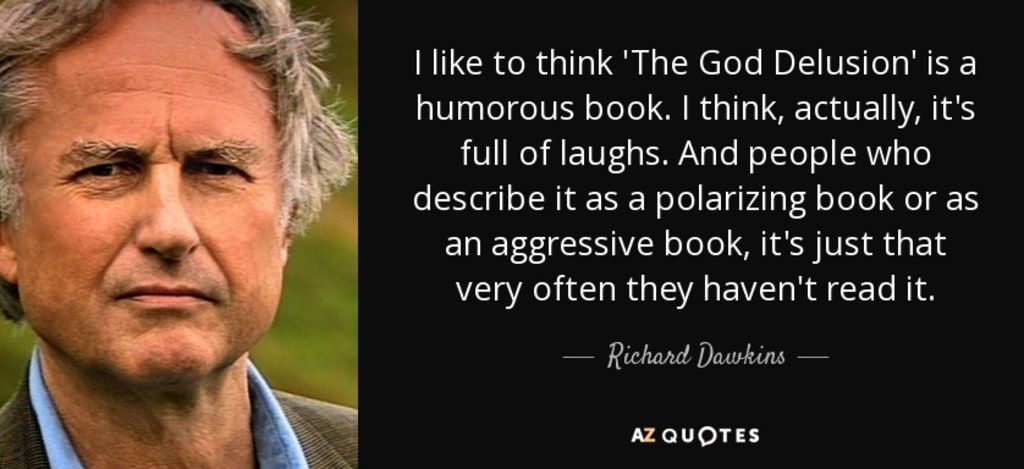The God Delusion:
Arguments Against the Existence of God | Richard Dawkins

I. Introduction
"The God Delusion" is a book written by evolutionary biologist Richard Dawkins, which was first published in 2006. The book presents a persuasive argument against the existence of God, using scientific evidence and logical reasoning. Dawkins is well-known for his atheistic beliefs and his criticism of religion, and this book is a seminal work in the field of atheism and rationalism. In this article, we will explore the main themes and arguments of "The God Delusion" and why it matters.

II. Arguments against the existence of God
Atheism as a lack of belief
Dawkins defines atheism as a lack of belief in God, rather than a belief in the non-existence of God. He argues that the burden of proof lies with those who claim that God exists, and that the lack of evidence for God means that atheism is a more reasonable position.
The problem of evil
Dawkins also argues that the existence of evil in the world is incompatible with the concept of an all-powerful and benevolent God. He points out that if God is all-powerful and all-good, then he should be able and willing to prevent evil, but the existence of evil implies that either God is not all-powerful, not all-good, or does not exist.
The anthropic principle
The anthropic principle is the idea that the universe is fine-tuned for the existence of life. Dawkins argues that this is not evidence for the existence of God, but rather a result of natural selection and the laws of physics. He also points out that if the universe was designed for life, it is a very inefficient design, as most of the universe is hostile to life.
The lack of evidence for God
Dawkins argues that there is no empirical evidence for the existence of God, and that the existence of God cannot be proven by philosophical arguments. He also critiques the idea of faith as a means of knowledge, arguing that faith is a unreliable method of discovering truth.
III. Evolution and religion
The compatibility of science and religion
Dawkins argues that science and religion are fundamentally incompatible, as science relies on empirical evidence and reason, while religion relies on faith and revelation. He also points out that many religious beliefs are contradicted by scientific discoveries, such as the theory of evolution.
The conflict between creationism and evolution
Dawkins is a vocal critic of creationism and intelligent design, arguing that they are pseudoscientific and lack any empirical evidence. He also points out that the evidence for evolution is overwhelming, and that evolution is the foundation of modern biology.
IV. Rationalism and spirituality
The limitations of faith
Dawkins argues that faith is a dangerous and limiting concept, as it discourages questioning and critical thinking. He also points out that many atrocities throughout history have been committed in the name of religion.
The benefits of reason and evidence
Dawkins advocates for rationalism and scientific inquiry as the best ways of understanding the world. He argues that reason and evidence allow us to discover the truth and improve our lives, and that science has been the most successful method of discovering knowledge about the world.
V. Dawkins' critique of religious beliefs
The harm caused by religion
Dawkins argues that religion has caused immense harm throughout history, including wars, persecution, and oppression. He also critiques the idea of religious morality, arguing that morality does not come from religion, but rather from empathy, reason, and human nature.
The irrationality of religious beliefs
Dawkins critiques many specific religious beliefs, such as the idea of a personal God, the idea of an afterlife, and the concept of original sin. He argues that these beliefs are not supported by evidence, and that they are fundamentally irrational.
VI. The role of science in society
The importance of scientific literacy
Dawkins argues that scientific literacy is essential for a functioning democracy and a healthy society. He also points out that many public policy issues, such as climate change and medical ethics, require a basic understanding of science to make informed decisions.
The dangers of pseudoscience and superstition
Dawkins warns of the dangers of pseudoscience and superstition, such as homeopathy and astrology, which can lead to harmful and irrational beliefs. He argues that scientific inquiry and critical thinking are the best ways to combat these dangerous ideas.
VII. Conclusion
In conclusion, "The God Delusion" by Richard Dawkins is a powerful critique of religion and a celebration of reason and evidence. Dawkins argues that atheism is a more reasonable position than belief in God, and that science and rationalism are the best ways to understand the world. He also critiques many specific religious beliefs, and argues that religion has caused immense harm throughout history. Overall, "The God Delusion" is a thought-provoking book that challenges readers to think critically about their beliefs and the role of religion in society.
About the Creator
Subin @vocal
Not a Regular Blogger. But loves to share my thoughts, movie and drama recommentations.






Comments
There are no comments for this story
Be the first to respond and start the conversation.